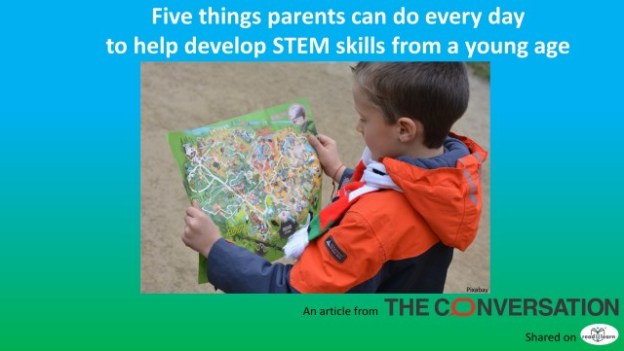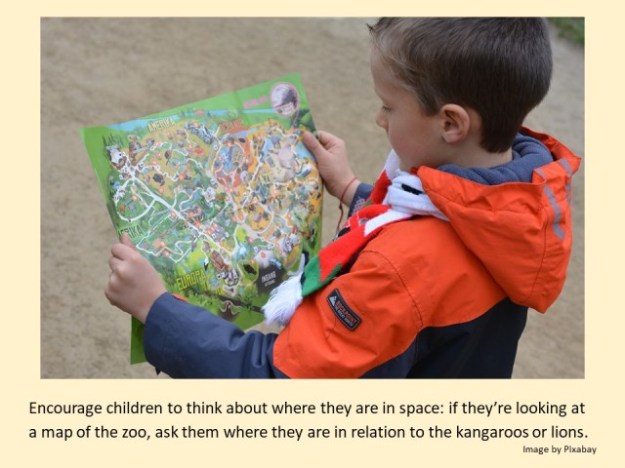The development of STEM (Science, Technology, Engineering and Mathematics) skills can be encouraged in children, even before they start school, by parents who are attuned to opportunities for learning.
I’ve previously introduced you to Rebecca Johnson, Narinda Sandry, Brenda Miles and Susan Sweet with their books and suggestions for including STEM in early childhood classroom learning, and soon I will be interviewing Andrew King about his beautiful Engibear series of picture books that focus on the engineering component in STEM. These supplement my own posts about incorporating STEM in the classroom here and here.
In this post, I share with you Five things parents can do every day to help develop stem skills from a young age by Kym Simoncini Assistant Professor in Early Childhood and Primary Education, University of Canberra. This article was first published in The Conversation. Throughout Kym’s article, you will notice links to other articles. Be sure to follow the links for even more great ideas and resources.
Now over to Kym Simoncini, University of Canberra
Five things parents can do every day to help develop STEM
skills from a young age
Educators and researchers agree early literacy experiences are important for children’s cognitive and language development. For the past 30 years there has been a strong movement to foster children’s literacy skills. This has resulted in an abundance of information on how parents can do this by reading books, singing songs and nursery rhymes, playing word games and noticing print.
This is a good thing and should continue, given the importance of early literacy skills in learning to read, and how this leads to later success in school and life.
Continue reading: Five things parents can do every day to help develop STEM skills from a young age – Readilearn




Great Article! Early literacy skills are important at a young age and start even before entering into a formal setting.
LikeLiked by 1 person
Thank you for reading and commenting, Kendall. Those early years, before formal education begins, are the ones that are most crucial to learning and success in life.
LikeLike
Excellent post, Norah. One of the first things my shaman teacher told me was: Get out of the ‘why’ and stay in the ‘what.’ ‘Why’ is a daunting question, obscure and impalpable. I think encouraging these skills in children also needs to be tempered with common sense. I’ve known a few parents who overdid it to the point of discouragement. I guess as parents and educators we need to get out of our own way and put the interests of the child first ❤
LikeLiked by 1 person
Hi Tina. It’s interesting that your shaman taught you the same thing. “Why” can be a daunting question. How many times do we shrug our shoulders and say, “I don’t know”?
Common sense is a great tool. Sadly it’s often not too common. The last thing we want to do is to discourage children and their questions. We do need to “get out of our way and put the interests of the child first.”
LikeLiked by 1 person
Years ago I saw a sci-fi program where someone typed ‘Why’ into an early computer, which caused it to cycle in an endless loop and short out the hard drive 🙂
LikeLike
That’s hilarious, Tina — how to confuse a computer! It reminds me of those cards that say, “How to confuse a (whoever).” On both sides of the card are the words, “Please turn over.” 🙂
LikeLiked by 1 person
Good one, Norah! I’ll have to remember that for the next letter I write 🙂
LikeLiked by 1 person
🙂
LikeLiked by 1 person
It’s an important post, Norah. In fact, when it becomes a habit or routine, it also gets easier and natural to do without too much effort. We moved to a new house when my daughter was 2 years old but I stayed in the same school district to teach and took my daughter to the same babysitter. It was one hour drive each way. I played nursery rhymes and “Wee Sing” music in the car. By the time she went to preschool, she had all the nursery rhymes memorized, and was able to identify some classical music such as Sleeping Beauty and Swan Lake.
LikeLiked by 1 person
Thank you for sharing your thoughts and experiences, Miriam. Long car journeys are great for discussions and singing. I’m sure the language skills that your daughter developed assisted her learning in other areas as well. Listening to classical music is also good for brain development.
LikeLiked by 1 person
I bought a set of Mozart labeling Mozart for math, etc. Most of Mozart’s music has patterns and theme.
LikeLiked by 1 person
I’ve always noted the mathematics inherent in music. I’m not sure what the Mozart labels are though. How do they work?
LikeLiked by 1 person
I think by listening to the music helps the mind to have the ability to understand certain concepts. I’m not at home right now. When I get home, I’ll see what I have in that set. You probably can find them from Amazon and see if there are any descriptions,
LikeLiked by 1 person
I’ve read lots of reports about music helping. It certainly helps to create a positive mindset anyway.
LikeLiked by 1 person
I just went through some Cds for kids. They must be for older kids. The music is in the background with narration to help the kids understand the music. So I put them away for now. My 6 months old granddaughter is not ready for it. The Mozart CDs, I have “Effect on Strength and Clarity of Mind” etc. I used to have music in the background when I studies or working on term paper. It helped.
LikeLiked by 1 person
Thanks for checking them out, Miriam. Have a great weekend.
LikeLiked by 1 person
Thank you Norah. A wonderful weekend to you!
LikeLiked by 1 person
Thank you, Miriam. Mine was spent with family. I hope you had a lovely weekend, too. 🙂
LikeLiked by 1 person
I spent my weekend recovering from a cold. My husband had it at the same time. 🙂
LikeLiked by 1 person
I’m sorry to hear that both you and Hub weren’t well. I hope you’re both recovered now. 🙂
LikeLiked by 1 person
A couple more days and we should be okay. 🙂
LikeLiked by 1 person
I hope so. 🙂
LikeLiked by 1 person
Thank you, Norah. ❤
LikeLiked by 1 person
Pingback: Parents: Daily Develop STEM Skills. – The Militant Negro™
Excellent
LikeLiked by 1 person
Thanks, Beth. 🙂
LikeLike